*EXCLUSIVE INTERVIEW* Andrew Wilder Talks Criminal Minds!
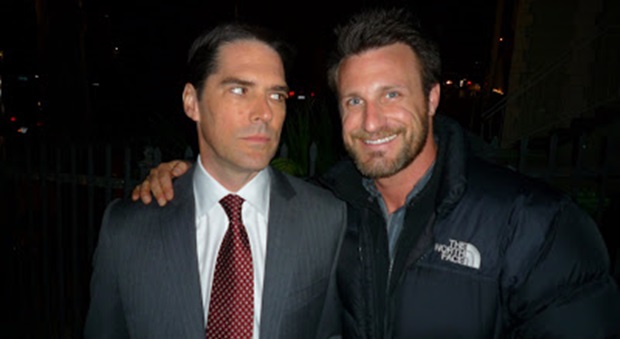 *EXCLUSIVE INTERVIEW* Andrew Wilder Talks Criminal Minds!
*EXCLUSIVE INTERVIEW* Andrew Wilder Talks Criminal Minds!
He’s responsible for some of the most unforgettable UnSubs, the most heart wrenching moments with our team, and the most gripping episodes of classic Criminal Minds. Quiet until now, the undeniably talented and fan favorite writer and producer (and new dad!) Andrew Wilder graciously agreed to talk with us during a break at his current gig, the critically acclaimed Secrets and Lies. He discusses his years in the Criminal Minds writers room, his take on the team, why he believes serial killers are so fascinating, and finally answers the burning question as to why he wasn’t asked to return for season 5.
“I would’ve fired me…”
TJ: I’d like to start by asking how you became a writer. Was it always something you knew you wanted growing up in New York, or did inspiration hit later in high school or college at USC? What made you decide on television as your focus medium?
AW: I was very fortunate. I knew early on that I wanted to write, and that I wanted to write for TV. I didn’t sleep well at that age, my teens, and I would stay up late and watch all there was to watch, and then I started writing. I came from a divorced family and I spent a lot of time watching TV, and something about it spoke to me. There was never much confusion for me, I was really lucky that I knew by the time I was in high school what I wanted to do. So I was able to focus, college, undergraduate on screenwriting.
TJ: What made you decide on USC?
AW: I needed a change of scenery – to get out of New York. For undergraduate screenwriting there were only two programs that I was aware of that were really the sort of fast track to get into the business. One was NYU. The other was USC. I didn’t even bother to apply to NYU.
TJ: What motivates you, what feeds your creativity?
AW: I find people’s behavior fascinating. There are different levels to what people show you. There’s what they say… and then there’s what they do. What people say and do when they think people are watching… and what they say and do when they think no one’s watching. What do they want? What do they need? Are they honest about their wants and needs? I guess, when it comes to writing, my creativity or my connection to writing a particular character or story is driven by the secrets people keep.
TJ: Serial killers have many secrets.
AW: Writing about serial killers really fascinated me because their “needs” must always be kept secret from the world. Their secret selves concealed at all times. Talk about a full time job. These people are monsters; obviously unnatural, twisted, and malevolent. So abnormal, so aberrant. And yet it’s a pattern that gets repeated over and over again. Why? You can take two people who grow up in the same house, have the same parents, and they take two completely different paths in life…one a good man, the other… a serial predator. The guy next door could be a secret monster seeking to prey upon his fellow man. Real monsters exist… but so do real heroes.
When I met Jim Clemente on the set of L.D.S.K., I was floored. There was this guy sitting next to me who was talking to Mandy you know, every take or so, and I realized I was sitting next to someone who actually did this for a living and I could not believe my luck! To me that was a real-life hero sitting next to me who had done all the things and more that our heroes on Criminal Minds were doing. And Jim and I hit it off immediately. I went to the FBI Academy and studied and we had lunch a couple of times. It was fascinating to me to actually sit down beside somebody who had made a choice to basically understand, confront and dedicate themselves to understanding… what to most of us would be unthinkable and clearly never be a space that we’d want to live in. And to me that’s truly heroic. The price that people pay for spending time in that world is immeasurable. People who would choose to go into that world and pursue that evil and let themselves be exposed to the horrible things that people do to each other is just sheer heroism. Good versus evil.
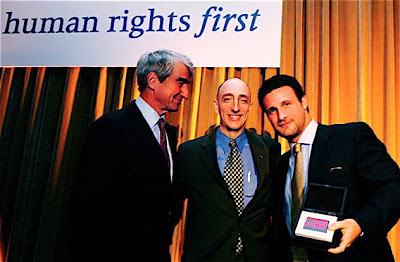
TJ: Jim has a large and open presence in the CM fan community and he lets loose and he tells it like it is. Doing what he does, all the people he helps while also consulting and dealing with his own health issues, and all else we don’t even know about. From what we know of Jim, he’s a great human, a survivor, and an incredibly talented writer.
AW: He had a brutal, difficult and impossible job, and he sacrificed so much to do it. Compared to that? Writing and stuff? It’s a holiday compared to that.
TJ: Can you tell us, how do you get out of the writers room in your head and just unwind? Do you have a favorite writer? Hobbies? How do you do that?
AW: For me, that’s one of my biggest difficulties as a writer. Unwinding. So many hours in the day you’re thinking about whatever you’re writing, about characters, thinking about story. Plot. Act outs. It’s very difficult to leave it behind because most days when you leave there’s still a story unfinished. But how do I get out of it? I read. I spend time with my family and friends. I do MMA. I’m a fan of shooting sports. Since I left CM I began to go to church which is very important to me. Plus, my wife and I just had a baby! So now it’s – when I’m done writing – it’s all about being a dad.
I will say that on CM, I didn’t know how to leave the writing behind in the room… the result wasn’t good for me. And it wasn’t good for the people around me.
Oh… the other thing that I do to unwind from writing is research. One thing that gets me out of the project I’m currently writing is researching the next project. I’m constantly researching. When I find something that fascinates me, I learn everything I can about it, that’s how I’ve always been. Even something that I have no expertise with, I’ll find somebody… like with Jim. When I met him I was like, I’m going to Quantico, I’m going to learn everything I can from this guy.
TJ: I saw that picture of you at Quantico. How was that – fun, intense, amazing?
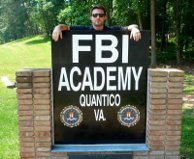
AW: Going to Quantico was really amazing, I didn’t get to go until the third year on the show, so it was such a treat to actually go there. Aside from the fact that our BAU set was a whole lot slicker than the real one, it was really amazing seeing the real thing. I was allowed to sit in on class Jim Fitzgerald was teaching about forensic linguistics – analyzing writing and speech to profile and ID UNSUBS. Where they were from? How old they were? How real their threats were? People often tell you who they are whether they intend to or not.
TJ: Do you feel like maybe you picked up a few profiling skills during your time on CM?
AW: I would never compare what I know about it to what someone like Jim Clemente or Jim Fitz… reading and or writing about profiling doesn’t make you a profiler.
TJ: A writer’s process is always interesting, and as varied as writers themselves. Can you share with us something of your process when sitting down to write an episode, or more specifically, when you wrote Elephant’s Memory?
AW: Elephant’s Memory departed from the other episodes I wrote, in that the other UNSUBS were serial killers… there was no justifying what they did. It was simply about compulsion. There was nothing behind what they did in most cases other than sociopathy – the psycho-sexual compulsion to kill. Their “love map” as we sometimes called it in the room – their blueprint for intimate relationships – had been distorted and mixed with violent sexual fantasy.
That was not the case with Owen…. with Owen it was different. The drive there was “justified anger”. The inability or unwillingness to let go of things – the pain, anger, and humiliation of bullying had so damaged Owen that he had lost the ability to forgive. He didn’t forgive or forget. His resentments metastasized into revenge fantasies. That’s really what Owen’s story was about; the importance of forgiveness. Owen’s list of resentments turned into a hit list. The ability to forgive doesn’t come naturally to everyone – but that doesn’t matter. You learn or you suffer for it. Owen had been victimized so horribly – that was terrible. But then he made a choice. He chose revenge over forgiveness. Owen’s choice is understandable – in a sense. But it is a terribly tragic mistake. The victim takes his revenge and becomes victimizer.
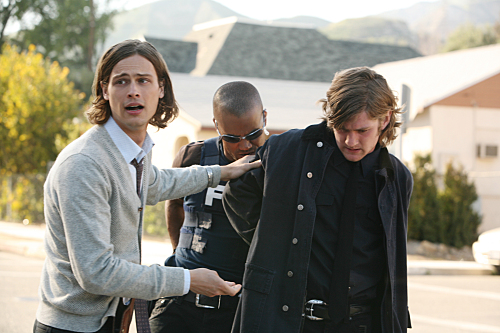
I felt Owen’s pain made him more accessible- more relatable than a lot of the other UnSubs I’d written. It was also a story I really wanted to tell. About someone who can’t forget who’s wronged them and how… who lives in that anger. It was the whole metaphor with the “elephant’s memory”. So that was where Elephant’s Memory came from. Plus Elephant’s Memory was the name of a band my uncle, Rick Frank, was in – and in many ways, Owen was modeled on him.
TJ: So your uncle maybe planted a nugget of thought in your head for this one?
AW: Yes. But the personal stories of the characters were always personal in some way to the writers. Working personal stories into the episodes made for better story telling. Give the personal crisis to the character and make them solve a case. In my scripts I always tried, in the case of the week, to echo, in some small way, a personal crisis, struggle or conflict within the series regulars, mirror it with our heroes. You know, Morgan struggled with faith in Lucky. Thomas, Hotch, struggled with his brother and his father in Ashes… the personal struggles of the characters in some way impacted the case in those stories.
TJ: You always made it all seem to come together so honestly and seamlessly.
AW: Thank you. But TV writing is a team sport. Everything in my scripts came from the room. We all put them together. The scripts were a product of the minds we had in the writer’s room. We had some great writers, and I do miss that room, I miss those people.
TJ: As a long time fan, that’s really nice to hear. Can you talk next about Omnivore, the first appearance of George Foyet?
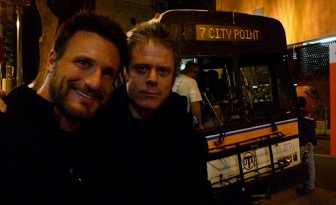
AW: Omnivore was based on… we started looking at killers that were exceptionally good at getting away with it, and interacted with the media. One was the BTK and the other was the Zodiac. There’s a misnomer out there that serial killers want to get caught? I don’t believe that’s true. I think they want to keep on killing as long as they can. So I talked to Jim Clemente about the guys who had gotten away with it… he pointed out to me that Dennis Rader (BTK) had almost gotten away with it scot free. He could have lived the rest of his life never getting caught, never doing it again. The problem was, somebody wrote a book, and that book was talked about on the local news in Kansas, and…they got it wrong, and Rader felt the need, his ego couldn’t let the insult stand. He felt compelled to correct the errors. So he contacted the local news affiliate that had run the story about the book. And that ego, that drive, is what got him caught.
We thought, how fascinating would that be to have someone who does that, but comes out of retirement. But also to have a cop who made a deal with the devil… or in this case – The Reaper. You understand why the cop made the deal he made with Foyet – but you also see how it didn’t fix the problem. It just postponed it. He had to live with that burden. It showed how the sins of our past have a funny way of coming back to haunt us. Some of those sins are the choices we make… the deals we make with ourselves, the sales we have to negotiate with our own conscience. I think Hotch knew he’d missed something – or let something go, back on the old Boston Reaper investigation. He knew The Reaper was still out there. But as a younger man, he was content to leave things as they were. That was a tacit secret unspoken deal Hotch made with himself. And the deal ended up having a very steep price for Hotch.
After I left the show, I’d heard it came back to bite him. And Haley.
TJ: Yes, in 100. The hundredth episode of the show which I feel was a masterpiece in terms of scope, continuity, writing, acting… it all really came together. The writer credited was not an actual person, but an amalgam of all the writers initials; ‘Bo Crese’. Then, four years later in season 9, Virgil Williams wrote an episode called Route 66 that explored the repercussions from that. Hotch’s old physical injuries from that encounter came back and affected him and there were sort of dream states with Haley and Foyet. It was nicely done.
I know you haven’t seen the show since you left, but aren’t you curious? I don’t mean to be callous in that I know in your leaving you went through a very tough time, personally. But aren’t you at all curious?
AW: No.
TJ: Strong reply!
AW: It’s simple. I like remembering the characters where they were when I left. It’s like being invited to watch someone else date your ex-girlfriend. You’ve moved on. You hear he’s a great guy. You’re happy that she’s happy… but you don’t need to watch.
TJ: Oh, man. That’s heartbreaking.
AW: It just wouldn’t be fun for me.
TJ: What was the best part about working in that environment of the first four seasons?
AW: The staff! The writers room. Being in that room with so many wonderful writers.. The other thing was the fans… it was my first show that I was staffed on, and the ability to interact with the fans on social media was (chuckles) a blessing and a curse… a blessing because you could get some reaction and feedback and see if things we were trying to pull off had worked… if people had been surprised by a twist. If clues we’d planted along the way had been too subtle… or too obvious. Our fans never missed a thing. I remember we got called you out when we’d mess up a timeline or were inconsistent with somebody’s backstory. They called us out every time.
TJ: Yeah, we still do that. How much collaboration actually goes on between writer and cast? Were there any particularly satisfying working relationships you formed with cast members? How flexible were you with ad-libbing, and was there any of that on set?
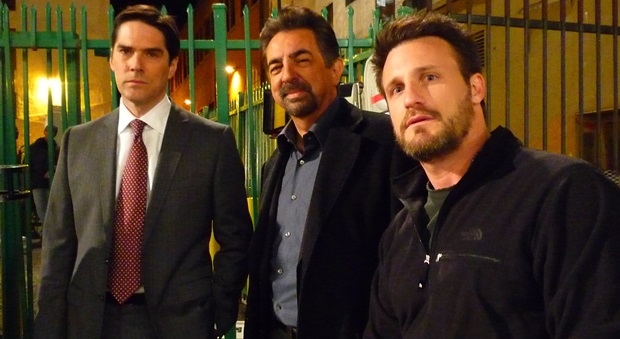
AW: Most of the collaborating happens after the table read, the actors would tell us if something concerned them or they didn’t understand it a line or a scene. If something we’d written struck something personal, they’d tell us if they wanted to dive into it or not, or if it’s too close to home. I felt we always had very collaborative relationships with the actors.
TJ: Will you share with us what the environment was like, the way things went in the writers room back then?
AW: The writers room, here’s how it worked: At the beginning of the season Ed had us come in with story ideas. Then Ed would figure out the order of the writing, and you’d tell him which story you wanted. Sometimes you got you second or third choice but I don’t remember anyone ever not getting a story they really wanted. Then the whole room would talk about the story idea – give the writer some ideas and direction and then the writer would gather research and put together a very rough outline, board, or beat sheet and then pitch it to the room. Then the room “breaks” the story by turning the whole thing into a real episode. Going scene by scene. I didn’t realize how lucky we were on Criminal Minds as a staff. Ed was very generous and patient when it came to his writers. He would give you notes. If you didn’t execute them right, he’d clarify his notes and give you another shot. And another. Some show runners will just take the script and rewrite you and that’s the end of it. But either Ed had a lot of faith in the staff or really hated re-writing. Because he did everything he could to let the writers write their own episodes… and that allowed the distinct unique voices of the writers to come through. The fact that the fans noticed those different voices was a credit to how Ed ran his staff.
TJ: Which character came easiest to you, and which was the most difficult to write?
AW: Well I don’t know how people are going to read into this, but the UNSUB is the easiest, always the easiest for me to write. The compulsion… the need to do something that wasn’t necessarily productive for society in any way. I really spent a lot of time trying to understand them so they felt real. I also based them on real serial killers… or two serial killers spliced together.
I liked writing Hotch. Thomas and I had a good working relationship. But it really came from the fact that in my mind, my perception, Hotch was the most accessible to me because he presented most like a real FBI agent, the agents I’d seen. They looked like him. Dressed like him. They sounded like him. I mean, really… if someone never saw the show and you lined the whole cast up and said “Which one of these people is an FBI agent?” In my mind… it’s Hotch. I guess he felt sort of iconic, square-jawed and stoic.
I also liked writing Reid. I respected the character. The way I imagined Reid was that he was, is, and always will be that smartest kid in the room. They always need a kid like that in the room. But in most cases, no one want be around him. The work was never the challenge for Reid. Getting along with the other people he worked with… that was the trick. That was his burden. I found very fascinating. He had a gift that could be a curse depending on how he used it.
I mean though, I love all of them. I loved Rossi! I love getting chance to write him early on. And Joe was the best. One of my favorite scenes to write was when Rossi came in, and like in Lucky, when Shemar came in and said to him “Hey whatever you do, don’t make me talk to the priest because I got an issue…” I loved Joe in that scene. He played it old school cop. He looked at Morgan and his eyes say ‘You don’t get to make requests like that in the FBI. You fear it? You face it and field it like the rest of us.” Rossi throws him right under the bus and sends him into the priest. On the page Rossi seemed like a total jerk. But when Joe played it, Rossi wasn’t mean – he was just old school. Like ‘if you come at me with a weakness, I’m gonna throw you right at it.’ We’re all only as strong as our weakest link. And I’d seen that sort of thing with cops and FBI and so I wanted to try to see if we could work it into Rossi. Joe sold it. Big time.
TJ: I have to say, with Reid in particular, the way that you wrote him was flawless. Brave and brilliant and always putting others first. Complex and emotional and well-respected by the rest of the team. You always made his contributions vital to the success of the case.
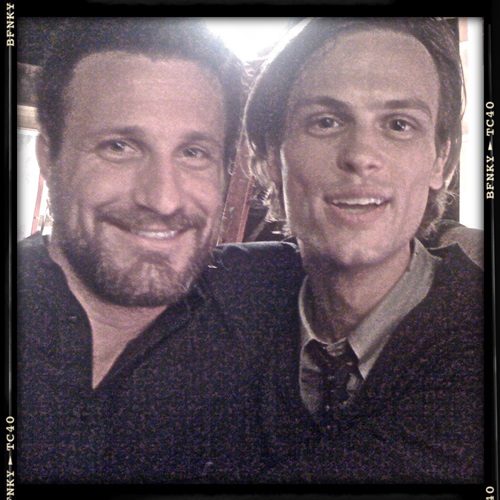
AW: He came to us really well-drawn, and I think fascinating. The reason I warmed to him the way I did was that he had an obvious dilemma. He knew everything. Except how to get along with people. There’s a right way and a wrong way to use a gift, and you could just as easily see Dr. Reid being persona non grata and not getting along with anyone on the team. I thought that was an unusual problem for his character. I always respected Reid for finding a way to manage that, handle his gift. We all felt it would be interesting to show how easily Reid could turn to drugs despite his gift…. and then show how his addiction would impair his ability to use his gift in a way that didn’t alienate every single person close to him. In short, I felt for Reid. I always wanted to give him a blanket and a puppy… a basset hound.
TJ: So you made him sweet.
AW: (Laughs) Yeah – the funniest thing I think I ever heard on the show, was when Matthew was talking about how he wanted Reid’s hair to look. He said he wanted Reid’s hair to be that of a ‘drunken soccer mom’. I dare you to go back and look and tell me they didn’t nail it.
TJ: That sounds very much like the Matthew we’ve come to know and love.
AW: Right, there’s no mistaking who made that comment.
TJ: Could you briefly share your ideas for a few of the characters futures, say, Reid and Hotch. How might you have matured Reid, changed Hotch? Were there any through-lines you wanted to pursue for any of the characters?
AW: No… no. It’s not my job and I respect the people who work there now and who have been the stewards of those characters and their story lines.
TJ: Did you always see the team as a family of sorts, or was that something that you feel evolved as they worked so closely with one another through the years?
AW: In season 1, someone in the room had broken down the BAU as a family and in that family dad was Gideon. I don’t mean this in any feminine way but Hotch was the mom, because he kept things moving, kept everybody fed, kept everything moving forward. Mom kept the machine moving forward. Big brother Shemar, little brother Reid, sibling sisters Paget and JJ…Penelope the kooky cousin being everybody’s favorite. I will say, if I miss writing for anybody? I gotta say, it’s probably Garcia. Ooof. Shooting her in Lucky… that was something. That was one of those twists that you might have seen coming if you watch the show enough, but it didn’t matter – even if you expected it, it was going to hurt. Like a slow-moving car wreck, you couldn’t take your eyes away… shooting her was an idea that came out of the room and happened to land in Lucky. But it didn’t matter. My name was on Lucky. I saw the first cut of the episode all I could think is “the fans are going to want to kill me.” Which they did.
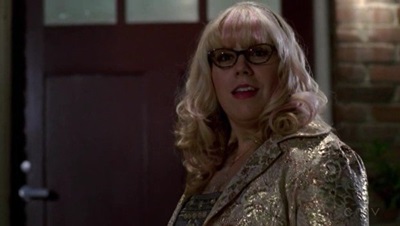
TJ: As a viewer I can confirm, that’s a perfect description of that scene. For that to happen to that sweet girl was pretty flattening.
AW: Garcia’s story there was about how some of us become victims. Jim Clemente talked about your first reaction to people…. the very first instinctive reaction… victims often sense that something just is not right about the person who had approached them. They get a warning, but they suppress it. They suppress it because they don’t want to seem rude. They don’t want to seem paranoid. They don’t want to seem racist. So they ignore the warning. The victim’s impulse to fit in socially is something that sociopaths prey on. Scary.
TJ: Right, and Morgan felt that. He was “Hmm, this doesn’t seem right…”
AW: For Morgan, that story was about how to talk to people. And he wasn’t very sensitive or gentle about what he said to Garcia about why a really good-looking guy would want to be involved with her. It was insensitive and it upset her, and it was then guilt on his part because if he hadn’t come at it that way, she might have listened, and not taken that bullet. So it’s a cautionary tale about how people talk to each other. As I learned on the show, there’s a right way to say things and there’s a wrong way to say things.
TJ: Did an actor ever surprise you (good or bad) with their take on a scene that was different from how you visualized it when you wrote it?
AW: I was constantly surprised by our actors. We had great actors. One of my biggest surprises came on the set of The Tribe… when we did all the physical action with Thomas? He was so much better, so much more of an action hero, he just slipped right into it, I guess he’d done stage acting, stage fighting, combat… but it was really spectacular, really great how he got into those action scenes and I think he had a lot of fun doing them. But I can’t remember off hand a choice that one of them made that surprised me. Not because they didn’t. Because it’s been a while… let me think on that one.
TJ: You have many fans as you must know, and they still care very much about what happened to you when you weren’t asked to return for season five. We felt (and still feel) as though we lost a skilled and genuine writer who completely understood our heroes, and the show suffered because of it.
AW: To anyone who feels as you described – I apologize. My departure was my fault. Completely. I wasn’t asked to return for season five and there’s no one to blame for that but me. The short version is I began to abuse pain medication that I’d been taking for a serious back injury. As time went on, it had a worse and worse effect on my behavior. It’s a credit to Ed that he was as patient and as tolerant as he was to me. I look back on it now… I would have fired me.
TJ: I can’t imagine…
AW: As I said TV writing is a team sport. On any team in any sport, a player can be strong on the field. Of course that’s important. But if that player walks off the field and is a cancer in the locker room… he’s death for the team. You can’t have it. You got to cut him. The fact that they did… is nobody’s fault but my own. That’s the bad news. The good news is that nobody I’ve worked since I left Criminal Minds has had to work with that guy.
TJ: That’s incredibly self-aware and personal. Thank you for speaking about that.
AW: Thank you for giving me chance to take responsibility and attempt to make amends to the fandom.
TJ: Andrew, of everything you’ve done, what’s your favorite thing you’ve ever written, your entire career?
AW: “Sons of Mars” – the spec pilot I just finished. No one’s read it yet, so it’s still perfect.
TJ: We’ll be looking forward to that! After leaving Criminal Minds, you also wrote for Those Who Kill, notably the “Space Cowboy” mini-arc. Where did the motivation to write him originate, and what would you like the readers to know about that particular killer, that particular show?
AW: Someone recently asked me if I felt I’d burnt myself out on the serial killer genre after CM. My response… I told that person to watch the last three episodes of Those Who Kill. The killer in TWK, “The Space Cowboy” was one of the UNSUBS that I had rattling around in my head since CM. He wasn’t a nice guy and I’m really proud of the way TWK turned out. But it actually made me sad when I saw the TWK episodes because I realized what an excellent adversary “The Space Cowboy” would have been for the team on Criminal Minds. I always think writing about serial killers is fertile soil. They are our modern day vampires. Werewolves. They are the things that go bump in the night. They are the real monsters. There’s just something about writing about them that’s fascinating, horrifying, and entertaining all at the same time. And obviously provides opportunity to show indescribable acts of heroism. Not just in the physical act of saving a victim, but the bravery that goes into trying to understand them.
TJ: We know you’re now writing for and producing Secrets and Lies which just got picked up for a second season – congratulations! How does working on that show compare or contrast with your time on Criminal Minds?
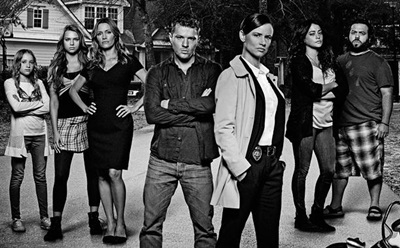
AW: I’m grateful for our fans who watched, who are still watching – Secrets and Lies is a great show. It’s one murder investigation played out over the course of the season. Season 1, we focused on the prime suspect played by Ryan Phillipe. This year we focus on a different character close to another murder. It’s a new and interesting way to tell the story. Season 2 will a new murder and an entirely new cast except for our cop, Det. Andrea Cornell – played by Juliette Lewis, who is spectacular.
TJ: Your fans would go bananas if you were offered the opportunity to return to Criminal Minds full time as writer/producer…
AW: My fans? Both of them? At the same time?
TJ: …would you ever consider it?
AW: I am happily employed on Secrets and Lies and love the showrunner Barbie Kligman. You hear that Barbie? You’re the best.
TJ: But hypothetically, would you ever consider going back?
AW: Hypothetically… well, I’d have a lot of episodes to catch up on.
TJ: Agreed! You would indeed! Thanks so much for talking to us, Andrew, and for sharing everything you have. It couldn’t have been easy, and I’m sure I can speak for “both” of those others in the fandom when I say we appreciate it, and you, very much. You’re always on the top echelon whenever the writers of Criminal Minds are discussed. It’s our fondest hope that you’ll find your way back there, and soon!
AW: Thank you… I appreciate this chance to catch up with the CM fandom. For four years you all spoilt me rotten… best fans ever. I miss you guys.
We miss you too. Thank you, Andrew Wilder!

Pingback: Former CM Scribe Andrew Wilder Set to Co-Exec Produce "FBI" This Fall!
Is your father Barry Wilder. If so I am sorry for your loss